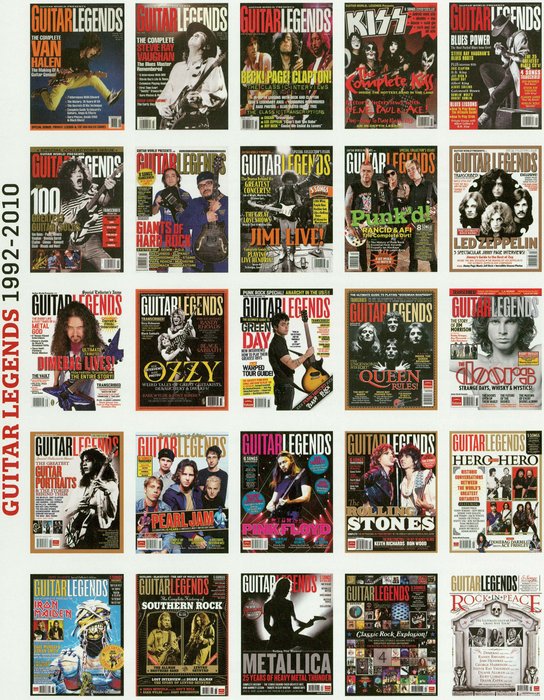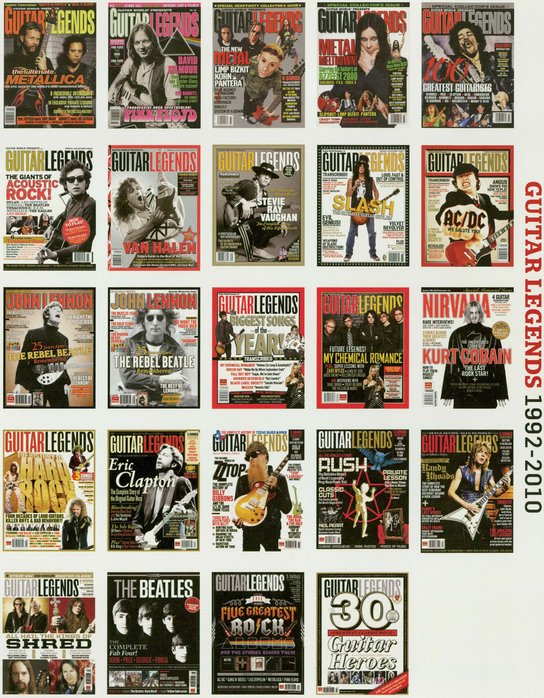NINETEEN ’92
Slash and Nuno dominate the covers as Guitar World
continues to celebrate guitar legends of the past, present
and—hello, Diamond Darrell and Kim Thayil-future.
Dear Guitar World,
Randy Rhoads, Jimi Hendrix, Cliff Burton and Duane Allman are just a few of the many great musicians who died relatively early in their careers. My esteemed colleagues and I have therefore calculated that Nelson will live forever.
—Jeremy Simmons
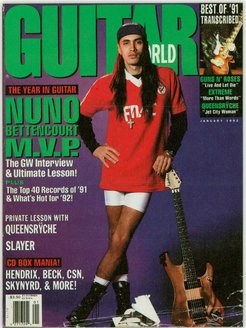
JANUARY Guitar World’s Player of the Year, Nuno Bettencourt, comments on the Red Hot Chili Peppers, who once accused Extreme of ripping them off. “Who’s that? Oh yeah, those are the guys that had a hit with that Stevie Wonder tune. I don’t usually buy records by bands that aren’t able to write their own material.”
COVER STORY BY BRAD TOLINSKI; PHOTO BY LORINDA SULLIVAN
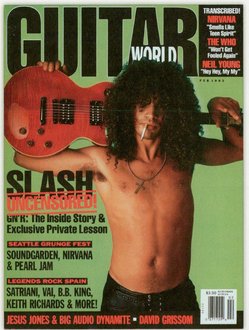
FEBRUARY As the sprawling Use Your Illusion records race up the charts, Slash comments on the mysterious departure of his co-guitarist, Izzy Stradlin. “I just can’t understand how he could let something like this just fall apart. I mean, the guy didn’t want to tour or do videos; he hardly wanted to record. I just never thought he was one of those guys that this would happen with.”
COVER STORY BY ALAN DI PERNA; PHOTO BY ANN SUMMA
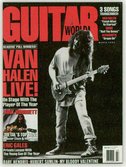
MARCH In this rare interview with all four members of Van Halen, the rockers discuss the ins and outs of playing live. As far as Eddie is concerned, onstage happiness is a matter of math.
COVER STORY BY BRAD TOLINSKI PHOTO BY LARRY DIMARZIO
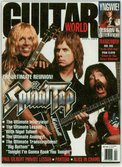
COVER STORY BY TEISCO DEL RAY PHOTO BY ANN SUMMA
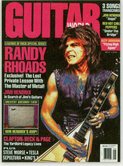
MAY Guitar World uncovers a Seventies-era private lesson with Randy Rhoads.
COVER STORY BY WOLF MARSHALL; PHOTO ILLUSTRATION BY FRANCISCO CACERES/PAUL NATKIN
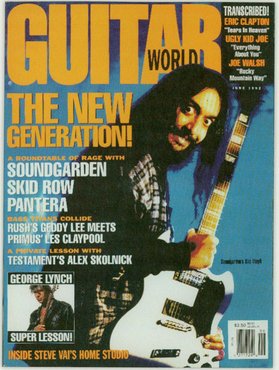
JUNE Guitar World celebrates the new generation of hard rock with a roundtable discussion between members of Soundgarden, Skid Row and Pantera. Soundgarden’s Kim Thayil comments on his unorthodox style of lead playing. “It’s hard to trace where my lead playing comes from. Even though I’m Indian, I didn’t grow up listening to Ravi Shankar or anything. My playing just evolved from experimentation.”
COVER STORY BY BRAD TOLINSKI; PHOTO BY KEVIN WISTENBERG
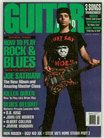
JULY Joe Satriani recalls how the recording of The Extremist nearly ended his studio career.
COVER STORY BY ALAN DI PERNA PHOTO BY ALDO MAURO
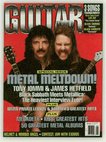
AUGUST Black Sabbath’s Tony lommi, the Godfather of Metal, and Metallica’s James Hetfield, thrash pioneer, meet face to face for the first time in this historic GW interview. In a moment Hetfield will never forget, lommi shows him which fingertips were damaged in a factory accident in the Sixties.
COVER STORY BY BRAD TOLINSKI AND ALAN PAUL: PHOTO BY LORINDA SULLIVAN
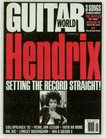
SEPTEMBER The inside story of the recording of Jimi Hendrix’s Axis: Bold As Love and Electric Ladyland.
COVER STORY BY JOHN MCDERMOTT AND EDDIE KRAMER; PHOTO BY TONY GALE
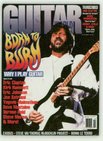
OCTOBER A host of legendary guitarists explain why they are “born to burn.”
COVER STORY BY JENNY BOYO, PH.D., HOLLY GEORGE-WARREN AND HAROLD STEINBLATT; PHOTO BY PHILIP OLLERENSHAW
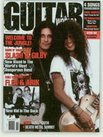
NOVEMBER Gilby Clarke becomes a permanent member of the Guns N’ Roses family.
COVER STORY BY BRAD TOLINSKI; PHOTO BY ROBERT JOHN
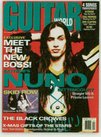
DECEMBER Extreme’s Nuno Bettencourt closes out 1992 with his second Guitar World cover story of the year—only this time, he elects to pose without his guitar.
COVER STORY BY BRAD TOLINSKI; PHOTO BY LORINDA SULLIVAN
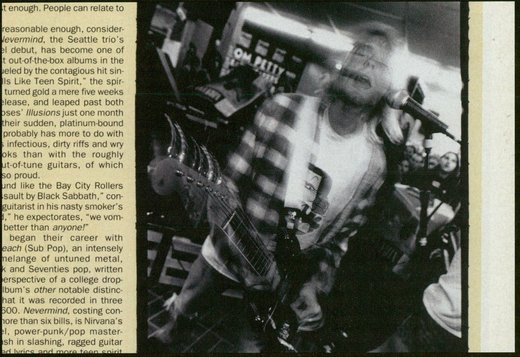
FEB.1992
VOL. 13 / NO. 2
Kurt Cobain
As grunge begins to pose a major threat to hard rock and metal, Kurt Cobain tries to explain to Guitar World’s Jeff Gilbert why Nirvana, third-hand guitars and all, is suddenly the hottest band in the country.
“We’re just musically and rhythmically retarded,” asserts Kurt Cobain, guitarist, vocalist and chief songwriter for Nirvana. “We play so hard that we can’t tune our guitars fast enough. People can relate to that.”
Seems reasonable enough, considering that Nevermind, the Seattle trio’s major label debut, has become one of the hottest out-of-the-box albums in the country. Fueled by the contagious hit single, “Smells Like Teen Spirit,” the spirited album turned Gold a mere five weeks after its release, and leaped past both volumes of Guns N’ Roses’ Use Your Illusion just one month later. But their sudden, Platinum-bound popularity probably has more to do with the band’s infectious, dirty riffs and wry lyrical hooks than with their roughly played, out-of-tune guitars, of which Cobain is so proud.
“We sound like the Bay City Rollers after an assault by Black Sabbath,” continues the guitarist in his nasty smoker’s hack. “And,” he expectorates, “we vomit onstage better than anyone!”
Nirvana began their career with 1989’s Bleach (Sub Pop), an intensely physical mélange of untuned metal, drunk punk and Seventies pop, written from the perspective of a college dropout. The album’s other notable distinction was that it was recorded in three days for $600. Nevermind, costing considerably more than six bills, is Nirvana’s major-label, power-punk/pop masterpiece, awash in slashing, ragged guitar riffs, garbled lyrics and more teen spirit than you can shake a Kiss record at.
GUITAR WORLD MTV thinks Nirvana is a metal band.
KURT COBAIN That’s fine; let them be fooled! I don’t have anything against Headbanger’s Ball, but it’s strange to see our faces on MTV.
GW Metallica’s Kirk Hammett is a huge Nirvana fan.
COBAIN That’s real flattering. We met him recently and he’s a real nice guy. We talked about the Sub Pop scene, heavy metal and guitars.
GW Speaking of guitars, you seem to favor low-end models.
COBAIN I don’t favor them—it’s just that I can afford them. [laughs] I’m left-handed, and it’s not very easy to find reasonably priced, high-quality left-handed guitars. But out of all the guitars in the whole world, the Fender Mustang is my favorite. I’ve only owned two of them.
GW What is it about the Mustang that works for you?
COBAIN They’re cheap and totally inefficient, and they sound like crap. They are also very small and don’t stay in tune, and when you want to raise the string action on the fretboard, you have to loosen all the strings and completely remove the bridge. You have to turn these little screws with your fingers and hope that you’ve estimated it right. If you screw up, you have to repeat the process over and over until you get it right. Whoever invented that guitar was a dork.
GW Is the Mustang your only guitar?
COBAIN No, I own a ’66 Jaguar. That’s the guitar I polish and baby—I refuse to let anyone touch it when I jump into the crowd. [laughs] Lately, I’ve been using a Strat live, because I don’t want to ruin my Mustang yet. I like to use Japanese Strats because they’re a bit cheaper, and the frets are smaller than the American version’s.
GW The acoustic guitar you play on “Polly” sounds flat.
COBAIN That’s a 20-dollar junk shop Stella—I didn’t bother changing the strings. [laughs] It barely stays in tune. In fact, I have to use duct tape to hold the tuning keys in place.
GW Considering how violently you play the guitar, you probably use pretty heavy-duty strings.
COBAIN Yeah. And I keep blowing up amplifiers, so I use whatever I can find at junk shops—junk is always best.
GW What was the last amp you blew up?
COBAIN A Crown power amp that was intended for use as a P.A., but which I used for a guitar head because I can never find an amp that’s powerful enough—and because I don’t want to have to deal with hauling 10 Marshall heads. I’m lazy—I like to have it all in one package. For a preamp I have a Mesa/Boogie, and I turn all the mid-range up. And I use Radio Shack speakers.
GW Ever get the urge to use a twang bar?
COBAIN No. Anybody that plays guitar knows that only Jimi Hendrix was able to use the standard tremolo and still keep it in tune. Those things are totally worthless. I do have one on a Japanese Strat, but I don’t use it.
GW Your first album, Bleach, was recorded for $600; how much did Nevermind run you?
COBAIN [laughs] I don’t remember; I’ve got Alzheimer’s. And don’t ask us how much our video cost; that’s a hell of an embarrassment. 
MARCH / VOL. 13 / NO. 3
THE PREMIERE OF GUITAR LEGENDS
Eddie Van Halen is the first to get the royal treatment in Guitar World’s new sister publication.
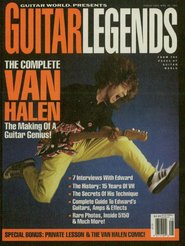
IN THE 18 YEARS SINCE its debut, Guitar Legends magazine has been the gold standard for special issues dedicated to a single artist or genre. Over the years we’ve devoted issues of Guitar Legends to a wide range of subjects, including Stevie Ray Vaughan, Randy Rhoads, Kiss, Dimebag Darrell, Iron Maiden, southern rock, punk rock, thrash metal and grunge. Each issue contains interviews and articles from the pages of Guitar World, plus guitar and bass transcriptions to some of the world’s best-known songs.
For Volume 1, Number 1 of this new publication, the Guitar World editors went with Eddie Van Halen as the cover-to-cover subject. Across 98 pages, the issue offered numerous interviews with the King, articles on his primary gear, a timeline history of the events leading to Van Halen’s formation and rise to rock power, and even a private lesson in which EVH demos some of his trademark licks.
But perhaps the issue’s most unique piece of content was the seven-page comic book in the middle chronicling Eddie’s legendary guest solo appearance on the Michael Jackson song “Beat It” (and how, in the end, Eddie received a big-fat nothing as payment). The comic, scripted by Brad Tolinski and illustrated by comic artist Stan Shaw, depicted the story of Eddie receiving a phone call from producer Quincy Jones, who called to ask Ed if he would play on a Michael Jackson song, and Ed going into the studio with Quincy, Michael—and Bubbles, Jackson’s pet chimp—to lay down the “Beat It” solo.

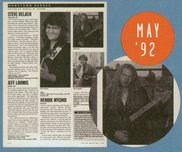
Hometown Hero: Jeff Loomis
Regular readers of Guitar Worlds should be well familiar with the name Jeff Loomis. Jeff’s history with the magazine actually dates back to 1992, when he was features as a Hometown Hero in the May issue. To be a Hometown Hero, players had to submit a cassette tape showcasing their six-string abilities along with a bio and a black-and-white photo, and the best of the best would make it to the magazine each month. Loomis’ three-song tape wowed the editors, prompting them to give the 20-year-old Seattle native the recognition he so deserved.
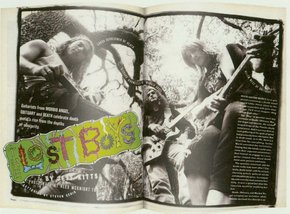
NOVEMBER / VOL. 13 / NO. 11
FLORIDA DEATH METAL SUMMIT
Members of Death, Obituary and Morbid Angel join forces in a historic roundtable; Deicide declines the invitation.
WHEN GUITAR WORLD FIRST proposed convening a death metal roundtable, those close to the bands responded with pure skepticism: “It’ll never happen—they all hate each other.”
The “they” in question were key members of Death, Obituary, Morbid Angel and Deicide, the unchallenged kings of the Florida death metal scene. And it was true that no such gathering of the gods of grind had previously been attempted. But in death metal, as in life, there’s a first time for everything. Guitar World extended the invitations, hoping that the bands could overcome their reported animosities—their hatred—to engage in a nice, guitar-related chat about death metal, past, present and future.
Death, Obituary and Morbid Angel accepted our invitation, while Deicide declined. The meeting took place in the summer of 1992 at Tampa’s Morrisound Studios, the most important death metal recording facility in the world. On hand were Death’s Chuck Schuldiner, Obituary’s Allen West, Morbid Angel’s Richard Brunelle and Guitar World contributing editor Jeff Kitts.
“This coverage is a good opportunity for bands like ours,” said Schuldiner. “It does a lot for the genre, and it means we’re starting to be taken seriously. If Glen [Benton, Deicide’s bassist/vocalist] doesn’t want to be here, that’s his right. But by not being here, he’s only feeding a negative vibe that already exists in the public eye. He should learn to put personal things aside, and get together with the rest of us. Maybe it would change the way people look at the scene.”
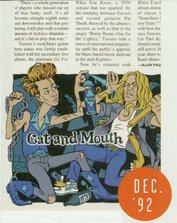
Cat Fight!
Dave Mustaine and Brian Setzer bare their claws in the December issue.
When Megadeth’s Dave Mustaine learned that his partner, Marty Friedman, had taken lessons from the Stray Cats’ Brian Setzer, he had this to say: “If Setzer’s coaching Marty, he’s doing a damn good job. But it sure doesn’t show in his own playing. I think he better have another dose of hairspray.” Setzer responded thusly: “Marty came over a few months ago, and although I don’t give lessons, it definitely was a lesson. If Dave can’t handle that, who cares? He was thrown out of Metallica, and admits that his entire group has to go to therapy to deal with him. He’s spent the last three years in a coma. And I think we all know who the hair farmer is...”
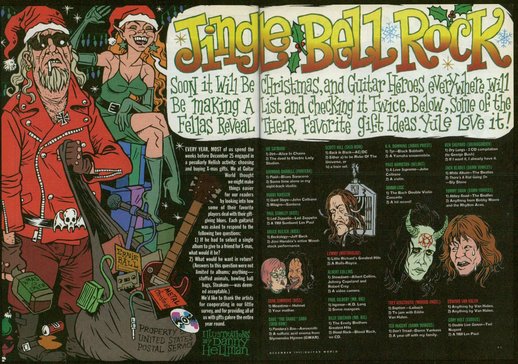
DEC. 1992
VOL. 13 / NO. 12
Jingle Bell Rock
A bevy of guitar heroes reveal their favorite gift ideas for the 1992 holiday season.
Every year, most of us spend the weeks before December 25 engaged in a particularly hellish activity: choosing and buying Christmas gifts. We at Guitar World thought we might make things easier for our readers by looking into how some of their favorite players deal with their gift-giving blues. Each guitarist was asked to respond to the following two questions:
- If he had to select a single album to give to a friend for Christmas, what would it be?
- What would he want in return?
Joe Satriani
- Dirt—Alice in Chains
- The deed to Electric Lady Studios
Diamond Darrell
- Plaid–Blues Saraceno
- Some time alone in my eight-track studio
Robby Krieger
- Giant Steps–John Coltrane
- Milagro–Santana
Paul Stanley
- Led Zeppelin–Led Zeppelin
- A 1959 Sunburt Les Paul
Gene Simmons
- Meantime–Helmet
- Your mother
Lemmy Kilmister
- Little Richard’s Greatest Hits
- A Rolls-Royce
Paul Gilbert
- Ingenue–k.d. lang
- Some mangoes
K.K. Downing
- Tyr–Black Sabbath
- A Yamaha snowmobile
Trey Azagthoth
- Baptism–Laibach
- To jam with Eddie Van Halen
Ted Nugent
- Don’t Tread–Damn Yankees
- A year off with my family
Edward Van Halen
- Anything by Van Halen
- Anything by Van Halen
Kim Thayil
- Badmotorfinger–Soundgarden
- My two front teeth
Eric Johnson
- Letter from Home–Pat Metheny
- Peace and tranquility
Zakk Wylde
- Dreams–The Allman Brothers Band
- A one-year supply of dog food for five dogs and a one-year supply of diapers
Ritchie Blackmore
- Any Christmas selection of or by Mannheim Steamroller and “Snoopy vs. the Red Baron” by the Royal Guardsman
- See number 1
Warren Haynes
- The Otis Redding Story to a non-guitar player; Blow by Blow–Jeff Beck, to a guitar player
- George Bush out of the White House
Steve Morse
- A compilation tape featuring the greatest solos of Jeff Beck, Eric Clapton, Jimmy Page, Eddie Van Halen, Joe Walsh, Buddy Guy, B.B. King and a whole lot of other guys.
- The ability to look forward to every new day
Scott Ian
- It Takes a Nation of Millions to Hold Us Back–Public Enemy
- Madonna
Carlos Santana
- Sketches of Spain–Miles Davis
- Band of Gypsys–Jimi Hendrix
Rocky George
- Tribal Tech–Scott Henderson
- A 1963 mint-condition Corvette
